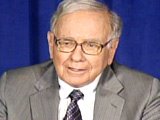 "I love it when I'm around the country club, and I hear people talking about the debilitating effects of a welfare society," he said. "At the same time, they leave their kids a lifetime and beyond of food stamps. Instead of having a welfare officer, they have a trust officer. And instead of food stamps, they have stocks and bonds."
"I love it when I'm around the country club, and I hear people talking about the debilitating effects of a welfare society," he said. "At the same time, they leave their kids a lifetime and beyond of food stamps. Instead of having a welfare officer, they have a trust officer. And instead of food stamps, they have stocks and bonds."-Warren Buffett, second richest man in America, quoted in the New York Times, 26 June 2006. Buffett will be giving $31 Billion to the Bill & Melinda Gates Foundation.
“Lois Lane has always been one of the more boring figures in popular mythology: she exists to get into trouble. Margot Kidder tries to do something with this thankless part, but she’s harsh-voiced, and comes across as nervous and jumpy; she seems all wrong in relation to Reeve, who outclasses her. He’s so gentlemanly that her lewdness makes one cringe. (We aren’t given a clue to what our hero sees in Lois Lane. It might have been more modern fun if he hadn’t been particularly struck by her until she’d rejected his cowardly Clark Kent side for his Superman side—if, like any other poor cluck, he wanted to be loved for his weakness.)”
-Pauline Kael, reviewing the 1978 Superman for The New Yorker.
“Intentionally or not, the Jesus angle also helps deflect speculation about just how straight this Superman flies. Given how securely Lois remains out of the romantic picture in "Superman Returns," now saddled with both a kid and a fiancé (James Marsden), it's no surprise that some have speculated that Superman is gay. The speculation speaks more to our social panic than anything in the film, which, much like the overwhelming majority of American action movies produced since the 1980's, mostly involves what academics call homosocial relations. In other words, when it comes to Hollywood, boys will be boys and play with their toys, whether they're sleeping with one another or not, leaving women to weep, worry and wait to be rescued.”
-Manohla Dargis, “'Superman Returns’ to save Mankind from its Sins”, The New York Times, 27 June 2006. (It seems that she did not bother to actually watch the movie.)
“The Usual Suspects was a game by comparison, and yet the Spacey figure in that film, Keyser
 Soze, was an infinitely tougher conceit than the Man of Steel; he was a man with the ambitions of a superman, and the extremity of that delusion made him at once venomous, elusive to the touch, and richly entertaining. After that, any actual superman was bound to be a bore. “Mankind is a rope fastened between animal and superman—a rope over an abyss.” That is Nietzsche, coiner of the Übermensch, and in “Thus Spake Zarathustra” he scorns what he calls “extraterrestrial hopes” in favor of those, rooted on earth, who struggle to overcome the weakness of their own humanity. That is a proper, if perilous, subject for grownup cinema, and I for one have grown tired of supermen, and superwomen, who start with such a flagrant advantage over the rest of us.”
Soze, was an infinitely tougher conceit than the Man of Steel; he was a man with the ambitions of a superman, and the extremity of that delusion made him at once venomous, elusive to the touch, and richly entertaining. After that, any actual superman was bound to be a bore. “Mankind is a rope fastened between animal and superman—a rope over an abyss.” That is Nietzsche, coiner of the Übermensch, and in “Thus Spake Zarathustra” he scorns what he calls “extraterrestrial hopes” in favor of those, rooted on earth, who struggle to overcome the weakness of their own humanity. That is a proper, if perilous, subject for grownup cinema, and I for one have grown tired of supermen, and superwomen, who start with such a flagrant advantage over the rest of us.”-Anthony Lane, reviewing Superman Returns in this week’s New Yorker.
"Those who restrain desire, do so because theirs is weak enough to be restrained; and the restrainer or reason usurps its place & governs the unwilling."
-William Blake, The Marriage of Heaven and Hell
"The poor useth intreaties; but the rich answereth roughly."
-Proverbs 18:23





No comments:
Post a Comment